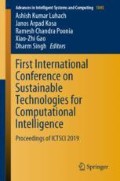Abstract
A lot of work has been attempted in the area of sentiment analysis (SA)/opinion mining of natural language texts (NLT) and social media. One of the major objectives of such tasks is to allocate polarity either positive (+ve) or negative (−ve) to a part of the text. But, at a similar time, the problem of assigning the degree of positivity and negativity of particular text occurs. The problem becomes more difficult in the case of text gathered from social sites, as these sites contain a number of emoticons and sarcasm words that have hidden meaning along with the expressions. In this paper, we have presented an emoticons and text sarcasm detection system. The value of the uploaded text document is generated by removing the stop words and data filtration process. Here, two types of polarities are identified, namely positive and negative for both sarcasm and emoticons with 100% accuracy. For classifying the polarities, artificial neural network (ANN) is used as a classifier. At last, the comparison between proposed work and existing work is discussed.
Access this chapter
Tax calculation will be finalised at checkout
Purchases are for personal use only
References
Bouazizi, M., Ohtsuki, T.: Opinion mining in Twitter: how to make use of sarcasm to enhance sentiment analysis. In: Advances in Social Networks Analysis and Mining (ASONAM), 2015 IEEE/ACM International Conference on, pp. 1594–1597. IEEE (2015)
Liu, B.: Sentiment analysis and opinion mining. Synth. Lect. Hum. Lang. Technol. 5(1), 1–167 (2012)
Kobayashi, N., Inui, K., Matsumoto, Y.: Opinion mining from web documents: extraction and structurization. Inf. Media Technol. 2(1), 326–337 (2007)
Zheng, L., Wang, H., Gao, S.: Sentimental feature selection for sentiment analysis of Chinese online reviews. Int. J. Mach. Learn. Cybernet. 9(1), 75–84 (2018)
Etter, M., Colleoni, E., Illia, L., Meggiorin, K., D’Eugenio, A.: Measuring organizational legitimacy in social media: assessing citizens’ judgments with sentiment analysis. Bus. Soc. 57(1), 60–97 (2018)
Asghar, M.Z., Kundi, F.M., Ahmad, S., Khan, A., Khan, F.: T‐SAF: Twitter sentiment analysis framework using a hybrid classification scheme. Expert Syst. 35(1) (2018)
Asghar, M.Z., Khan, A., Khan, F., Kundi, F.M.: RIFT: a rule induction framework for twitter sentiment analysis. Arab. J. Sci. Eng. 43(2), 857–877 (2018)
Zhang, S., Wei, Z., Wang, Y., Liao, T.: Sentiment analysis of Chinese micro-blog text based on extended sentiment dictionary. Future Gener. Comput. Syst. 81, 395–403 (2018)
Fouad, M.M., Gharib, T.F., Mashat, A.S.: Efficient twitter sentiment analysis system with feature selection and classifier ensemble. In: International Conference on Advanced Machine Learning Technologies and Applications, pp. 516–527. Springer, Cham (2018)
Chen, Z., Ma, N., Liu, B.: Lifelong learning for sentiment classification (2018). arXiv preprint arXiv:1801.02808
Wang, H., Castanon, J.A.: Sentiment expression via emoticons on social media. In: Big Data (Big Data), 2015 IEEE International Conference on, pp. 2404–2408. IEEE (2015)
Ghiassi, M., Skinner, J., Zimbra, D.: Twitter brand sentiment analysis: a hybrid system using n-gram analysis and dynamic artificial neural network. Expert Syst. Appl. 40(16), 6266–6282 (2013)
Prabowo, R., Thelwall, M.: Sentiment analysis: a combined approach. J. Informetrics 3(2), 143–157 (2009)
Rodrigues, D., Prada, M., Gaspar, R., Garrido, M.V., Lopes, D.: Lisbon emoji and emoticon database (LEED): norms for emoji and emoticons in seven evaluative dimensions. Behav. Res. Methods 50(1), 392–405 (2018)
Patra, B.G., Mazumdar, S., Das, D., Rosso, P., Bandyopadhyay, S.: A multilevel approach to sentiment analysis of figurative language on twitter. In: International Conference on Intelligent Text Processing and Computational Linguistics, pp. 281–291. Springer, Cham (2016)
Nadali, S., Murad, M.A.A., Sharef, N.M.: Sarcastic tweets detection based on sentiment hashtags analysis. Adv. Sci. Lett. 24(2), 1362–1365 (2018)
Mhatre, M., Phondekar, D., Kadam, P., Chawathe, A., Ghag, K.: Dimensionality reduction for sentiment analysis using pre-processing techniques. In: Computing Methodologies and Communication (ICCMC), 2017 International Conference on, pp. 16–21. IEEE (2017)
Asghar, M.Z., Khan, A., Ahmad, S., Qasim, M., Khan, I.A.: Lexicon-enhanced sentiment analysis framework using rule-based classification scheme. PLoS ONE 12(2), e0171649 (2017)
Author information
Authors and Affiliations
Corresponding author
Editor information
Editors and Affiliations
Rights and permissions
Copyright information
© 2020 Springer Nature Singapore Pte Ltd.
About this paper
Cite this paper
Gupta, S., Singh, R., Singla, V. (2020). Emoticon and Text Sarcasm Detection in Sentiment Analysis. In: Luhach, A., Kosa, J., Poonia, R., Gao, XZ., Singh, D. (eds) First International Conference on Sustainable Technologies for Computational Intelligence. Advances in Intelligent Systems and Computing, vol 1045. Springer, Singapore. https://doi.org/10.1007/978-981-15-0029-9_1
Download citation
DOI: https://doi.org/10.1007/978-981-15-0029-9_1
Published:
Publisher Name: Springer, Singapore
Print ISBN: 978-981-15-0028-2
Online ISBN: 978-981-15-0029-9
eBook Packages: Intelligent Technologies and RoboticsIntelligent Technologies and Robotics (R0)

